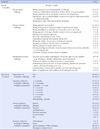Abstract
Purpose
The purposes of this study were to explore nurse' bullying experiences according to demographic characteristics and to identify effects of workplace bullying and job stress on turnover intention in hospital nurses.
Methods
One hundred sixty-one graduate students working as nurses were recruited. The collected data were analyzed using descriptive statistics, t-test, ANOVA, Pearson correlation coefficient, and Stepwise multiple regression with PASW 18.0.
Results
Results show that 23.0% of the nurses interviewed had experienced bullying in the workplace within the last six months and 19.4% had been bullied during the entire employment period. Bullying perpetrators included nurses (52.9%), physicians (23.0%), and patients (17.8%). Bully nurses consisted of senior nurses (63.0%), managers or supervisors (29.6%), colleagues (3.7%), and junior nurses (3.7%). Job turnover intention in hospital nurses was significantly correlated with workplace bullying (r=.20, p=.012) and job stress (r=.37, p<.001). The most significant predictors influencing the turnover intention of hospital nurses were job stress, age, and bullying in total career and these factors accounted for 21.0% of the variance.
Figures and Tables
Table 3
Workplace Bullying, Job Stress, Turnover Intention according to Socio-demographic Characteristics (N=161)

Table 4
Correlations among Workplace Bullying, Job Stress and Turnover Intention (N=161)

P-WPB=person-related workplace bullying; W-WPB=work-related workplace bullying; I-WPB=intimidation-related Workplace bullying: JD=job demand; IJC=insufficient job control; IC=interpersonal conflict; JI=job insecurity; OS=occupational system; LR=lack of reward; OC=organizational climate.
*p<.05, **p<.01.
References
1. Chang SJ, Koh SB, Kang DM, Kim SA, Kang MG, Lee CG. Developing an occupational stress scale for Korean employees. Korean J Occup Environ Med. 2005. 17:297–317.

2. Chung JH, Kim JS, Kim KH. The risk factors influencing turnover intention of nurses. J Korean Acad Nurs Adm. 2008. 14:35–44.
3. Einarsen S, Helge H, Zapf D, Cooper CL. Bullying and harassment in the workplace: Development in theory, research, and practice. 2010. 2nd. New York: CRC Press.
4. Einarsen S, Hoel H, Notelaers G. Measuring exposure to bullying and harassment at work: Validity, factor structure and psychometric properties of the Negative Acts Questionaire-Revised. Work Stress. 2009. 23:24–44.

5. Hutchinson M, Vickers MH, Wilkes L, Jackson D. A typology of bullying behaviors: The experiences of Australian nurses. J Clin Nurs. 2010. 19:2319–2328.
6. Jeong BU, Do BN. Job stress, self-efficacy and health promoting behaviors in hospital nurses. J Korean Acad Psychiatr Ment Health Nurs. 2002. 11:398–405.
7. Jo KH, Sung KW, Kim YK. A phenomenological study on the experience of hurt and forgiveness of clinical nurses in Korea after loss of employment. J Korean Acad Nurs. 2008. 38:561–572.

8. Johnson SL, Rea RE. Workplace bullying: Concerns for nurse leaders. J Nurs Adm. 2009. 39:84–90.
9. Kim HS, Lim HW, Chung SH, Choi SJ. An association among verbal abuse, social support and turnover intention for special unit nurses in a hospital. Korean J Occup Environ Med. 2009. 21:388–395.

10. Korean Institute of Hospital Management. Research on optimal manpower supply of hospital nurses. 2009. Seoul, Korea: Author.
11. Laschinger HK, Grau AL, Finegan J, Wilk P. New graduate nurses' experiences of bullying and burnout in hospital settings. J Adv Nurs. 2010. 66:2732–2742.

12. Lawler EE. Satisfaction and Behavior. 1983. New York: McGrow Hill.
13. Lee EH, Chang SJ, Kim HO, Roh JH, Park EJ, Won JO. Relationship between job stress and turnover of registered nurses in a university hospital. Korean J Occup Environ Med. 2007. 19:93–104.

14. Lee GH. A study analysis of the determinants of turnover intention among hospital employees. 1995. Seoul: Sungkyunkwan University;Unpublished doctoral dissertation.
15. Lee JM. Study on the impact of fairness perceptions on organizational commitment and turnover intention in compensation for telemarketer. 2005. Seoul: Chung-Ang University;Unpublished master's thesis.
16. Lee KS, Park EJ, Kim HJ, Ahn HR. An exploration on the stress of Korean graduate nursing students: Using of focus group research method. J Korean Acad Psychiatr Ment Health Nurs. 2011. 20:302–314.

17. Leymann H. The content and development of mobbing at work. Eur J Work Organ Psychol. 1996. 5:165–184.

18. MacIntosh J, Wuest J, Gray MM, Cronkhite M. Workplace bullying in health care affects the meaning of work. Qual Health Res. 2010. 20:1128–1141.

19. Mikkelsen EG, Einarsen S. Bullying in Danish work life: Prevalence and health correlates. Eur J Work Organ Psychol. 2001. 10:393–413.
20. Nam W. The relationship between workplace bullying and intention to leave among nurses in one university hospital. 2010. Seoul: The Catholic University of Korea;Unpublished master's thesis.
21. Nam W, Kim JW, Kim YK, Koo JW, Park CY. The reliability and validity of the negative acts questionnaire-revised (NAQ-R) for nurses for the assessment of workplace bullying. Korean J Occup Environ Med. 2010. 22:129–139.

22. Park HJ, Kang HS, Kim KH, Kwon HJ. Exposure to workplace violence and coping in intensive care unit nurses. J Korean Acad Psychiatr Ment Health Nurs. 2011. 20:291–301.

24. Rocker CF. Addressing nurse-to-nurse bullying to promote nurse retention. Online J Issues Nurs. 2008. 13(3):11.

25. Rutherford A, Rissel C. A survey of workplace bullying in a health sector organization. Aust Health Rev. 2004. 28:65–72.
26. Shin MK, Lim KH. Effects of emotional labor and occupational stress on somatization in nurses. J Korean Acad Nurs Adm. 2011. 17:158–167.

27. Simons S, Mawn B. Holmes D, Rudge T, Perron A, St-Pierre I, editors. Bullying in the workplace: A qualitative study of newly licensed registered nurses. 2012. Burlington: Ashgate Publishing Company;177–188.
28. Simons SR, Stark RB, DeMarco RF. A new, four-item instrument to measure workplace bullying. Res Nurs Health. 2011. 34:132–140.





 PDF
PDF ePub
ePub Citation
Citation Print
Print





 XML Download
XML Download